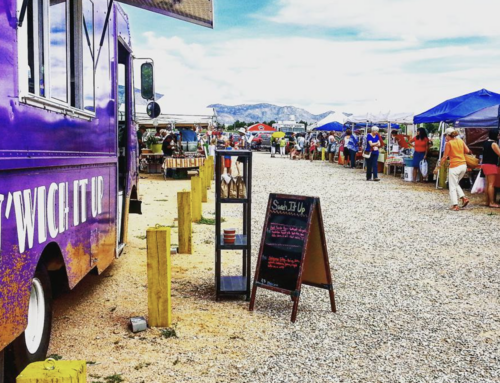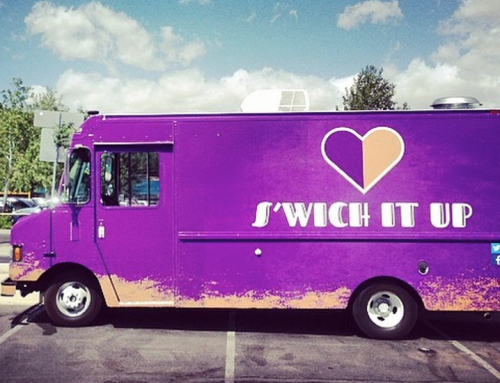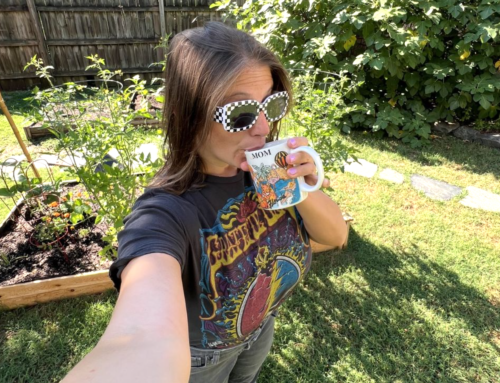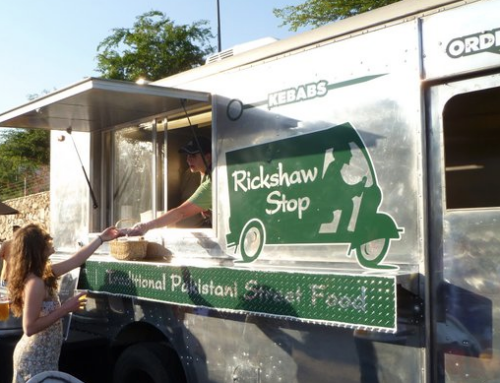Podcast: Play in new window | Download | Embed
Subscribe: RSS
Thinking about starting your own coffee truck? In this blog post we guide you through the steps required start a profitable coffee truck or cart business from someone that’s already done it. My goal is to give you step-by-step instructions on the startup process from market research to business planning, equipment and startup costs. Find out if you really want to open a coffee cart business below.
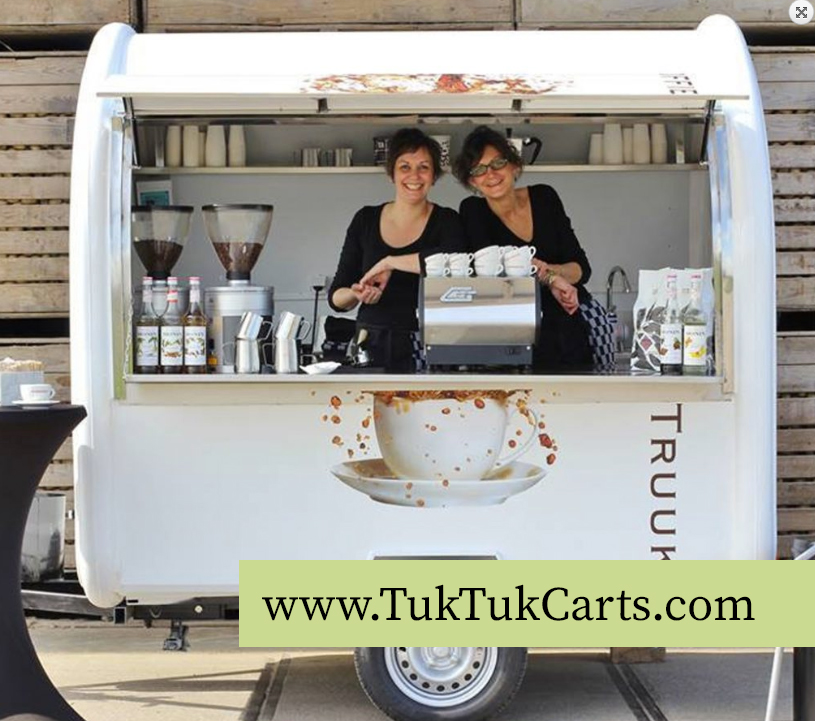
Learn how to start a coffee trailer like this one.
Background
Listen to the full podcast interview where you’ll learn how Drew created a one-of-a-kind brand for the Mo’ Joe A Go-Go coffee business. From sourcing of product to the equipment used on the truck everything is 100% unique. Matt Drew’s story began not unlike other mobile food entrepreneurs I’ve interviewed in the past. Drew was employed as a marketer in a corporate setting and found himself less and less passionate about the work.
Drew also had a daughter on the way and started to question the point of putting in 12 – 16 hours per day for someone else, and ultimately wondered what his legacy would be if he continued down this path. So Drew made the decision to change the trajectory of his life in a big way by starting a coffee truck.
Step 1: Market Research & Business Planning
The first step you need to take in starting a coffee truck business, before you even start thinking about the equipment, the size of cart to buy or the licenses you’ll need to operate is to take some serious time to consider the brand you want to grow. This means evaluating your competitors in the local market to see where your business can fit in and developing an in-depth business plan.
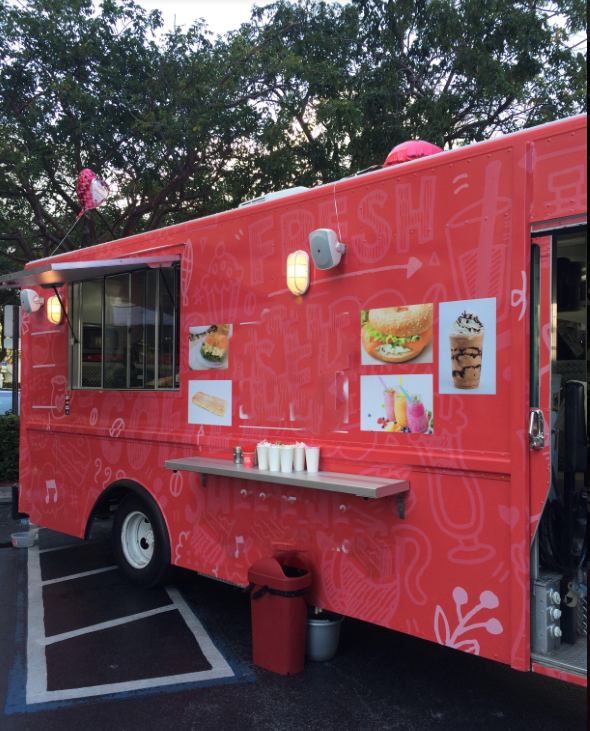
Outside an Italian style coffee truck.
Here’s how Drew differentiated his coffee truck from others in Texas:
- Organic Products: Drew emphasized that everything sold on the mobile unit would be organic and sustainably grown whenever possible. This requirement applies to every detail of the business from the food to drinks to the dairy served. The tagline of the business even reflects this: The Freshest Coffee Sustainably Grown and Artfully Crafted.
- Responsibly Sourced and Fair Trade Beans: One regrettable aspect of the coffee industry as a whole is farmer’s are often located less developed countries have often made the least amount of money from their product. Drew has worked to ensure that the beans purchase with his business are through farms are Fair Trade, meaning they have responsible growing practices and are fairly compensated.
- A Unique Product: By As you can see from the examples above that by following these brand guidelines, it results in a product you can’t get anywhere else locally as a consumer. If you want a cup of coffee with an impactful story behind it there’s only one place to find it.
Based on your competitor and market research, come up with a concept that stands out. This could mean specializing in artisanal coffees, offering a broad selection of beverages (like teas, smoothies, etc.), or even focusing on a particular theme or experience (eco-friendly practices, local sourcing, etc.).
You want to be able to say, “We’re doing something that nobody else is doing. We’ve got something that nobody else has and this is the only place you’re going to be able to find it.” Because if you can’t say that there’s really nothing compelling to be able to talk about with your brand. – Matt Drew on the importance of branding for mobile food owners.
Create a detailed business plan that outlines your vision, target market, competitive analysis, financial projections, and marketing strategies. This plan will be essential for guiding your business and securing any needed financing.
To have any type of successful food business, you need to be able to differentiate the core product in a meaningful way. By establishing the things that are most important to your business this will make the process easier.
Step 2: Make a Sample Menu
For a new coffee truck, it’s wise to start with a streamlined menu of around 8 to 12 items. This approach allows you to focus on quality, manage inventory efficiently, and streamline the training process for your team. And Caleb Goodrum of Refuge Coffee Co. points out, “You’ve got limited space in a coffee truck—every inch counts so you need to maintain a focused menu. ” Here’s what a small coffee truck menu might look like:
-
3 to 4 Coffee Classics: Include essential coffee offerings like Espresso, Americano, Latte, and Cappuccino. These cater to the traditional coffee drinker and form the backbone of your menu.
-
2 to 3 Specialty Drinks: Introduce a few unique or seasonal beverages that can differentiate your truck, such as a signature Mocha, a seasonal Pumpkin Spice Latte, or a unique Iced Coffee blend.
-
1 to 2 Non-Coffee Options: Not everyone drinks coffee, so having alternatives like Chai Latte, Hot Chocolate, or a selection of teas can broaden your customer base.
-
2 to 3 Food Items: Depending on your capability to handle food, offering a small selection of grab-and-go items like croissants, muffins, or breakfast sandwiches can complement the drinks and provide a complete breakfast.
Over time, you can gradually expand your menu based on feedback and sales data, introducing new or seasonal items that your customer base might enjoy.
Step 3: Coffee Truck Equipment Checklist
This is a checklist of basic equipment installed on a coffee truck. Pro Tip: Drew recommends investing in quality equipment versus the lowest priced because it’s the heartbeat of your business. You don’t want to be dealing with repairs, replacements, and a lower quality product.
- Espresso Machine: An espresso machine will be the most expensive single piece of equipment you install on a truck. Expect to pay between $2,000 – $10,000 depending on the model and if you anticipate buying new or used. The UNIC Stella Di Cafe is the exact model of espresso machine used by Drew. This is a high-end Espresso machine from Italy.
- Drip Coffee Maker: A significant percentage of your clientele will want a regular drip coffee. A commercial drip coffee maker will run you around $1,500 – $2,000. But you could invest even more if you want top of the line equipment.
- Grinder: This is required for grinding coffee beans on a daily basis for the freshest tasting coffee. The ballpark cost for a commercial grade grinder is $500 – $1,000.
- Blenders: For making blended coffee drinks and smoothies. A good commercial blender for a coffee truck needs to be durable, powerful, and able to handle high volumes of use throughout the day and will cost $1,000 – $2,000.
- Commercial Refrigerator: You need this to keep milk, cream, and other products cool. Expect to shell out $2,000 – $5,000 for something reliable.
- 3-Compartment Sink: This is a standard requirement anywhere you operate in the United States. This is needed to washing dishes, spoons, and other cutlery.
- Plumbing and Water Tanks: You need these to store clean and grey water. This is roughly $2,000 – $3,000 for equipment and installation by a processional. Unless you’re extremely handy, this is not a project you want to take on yourself.
- Cash Register or Point of Sale (POS) System: Crucial for processing customer transactions efficiently and managing sales data.
- Generator: If you plan to operate a coffee truck, don’t cut corners on this piece of equipment. As a coffee truck, you’ll have higher electrical requirements than most food trucks. Espresso machines, drip coffee makers, and blenders all require a lot of energy. You don’t want to lose power when you have a big rush and all your equipment is running. Around $3,000 – $7,000 should be invested on a quiet running generator that won’t scare off customers.
- Initial Inventory: Don’t forget about a the little things you need to start a coffee truck. Paper cups, stir straws, lids, napkins, sugar packets, coffee beans, cleaning supplies, a plastic garbage can and other necessities add up quickly. It’s essential that you take the time to itemize every little thing you end need to purchase for the truck. As a rough estimate, expect to pay $2,000 for inventory.
These are the basic components of a coffee truck, but keep in mind that your vision may require additional equipment. Do you plan to serve breakfast sandwiches? Consider a commercial panini maker. Take the time to figure out what you plan to serve on the truck and then work backward to determine equipment needs.
Determine your startup costs, which include the coffee truck, equipment, initial inventory, permits, and marketing expenses. Then, secure financing if needed, which could be through savings, loans, or investors.
Step 4: Build a Daily Operations Plan
Wondering what it’s like to operate a coffee truck truck on a daily basis? “My mornings typically start at about 3 a.m…. and that sucks.” says the founder of Mo’ Joe a Go Go Matt Drew.
Drew’s days usually start at 3 a.m. This has been a challenge at first because Drew used to be a night owl. But in order to get the serving window up between 6:00 a.m. and 6:30 a.m., it requires waking up a few hours early to prep for the day, drive to the vending location, and prepare for service.
Here’s what a typical day in the life of a coffee truck owner looks like:
Prep Work
- It takes roughly an hour each day to complete prep work. This includes cleaning for the day, grinding coffee beans, getting drip coffee ready, placing breakfast items like muffins out. Much of this work is completed at a commissary before heading out on the road.
Travel to Vending Location
- One of disadvantages of operating any type of food or beverage truck is that you need to commute to a different destination each day. Take the distance between your commissary and vending location into consideration before committing to it.
- Commuting to and from your home base is a non-revenue generating activity. The farther you drive the more gasoline you use too. Try to keep one-way drive times under 30 minutes whenever possible as a best practice for saving time and money.
Running the Coffee Truck
- As you might expect, morning is the busiest time for a coffee truck business. Coffee is a beverage most people enjoy after they wake up. As a result, you can expect more traffic before lunch as a general rule of thumb. Of course, you could always get into serving iced coffees to capture the afternoon crowd.
- Drew insists that you should not limit yourself to operating in the AM as a coffee truck. A rush of customers can happen at just about anytime depending on the location. As you get more familiar with your regular vending spots, you’ll get a sense of regular cadence between busy and slow times.
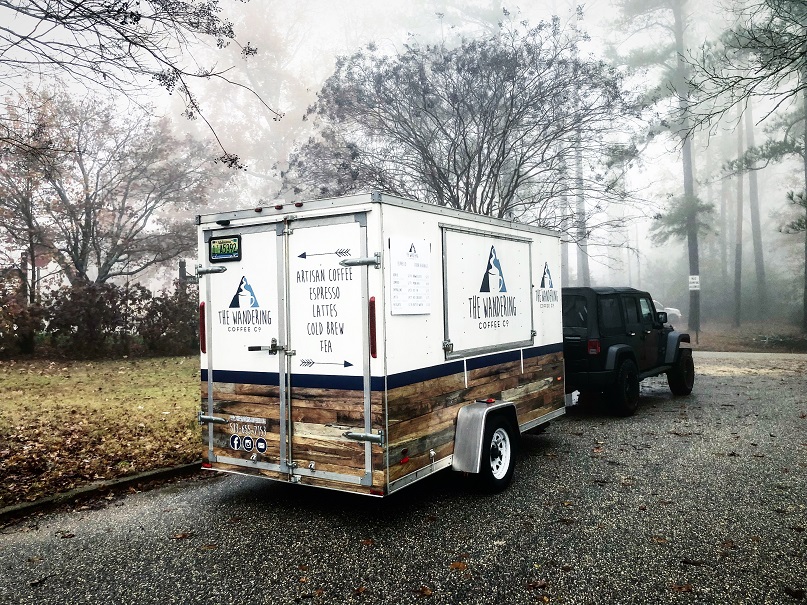
Opening a coffee trailer?
You can start to estimate your break even numbers for the business as a whole by determining the cost of your coffee, how many sales you anticipate, and the profit margin of each customer. I advise putting together a formal business plan to come up with a basic sales forecast.
As a general rule of thumb, you’ll want to shoot for over $100,000 in sales per year as a full-time owner operator. This will ensure you’re able to pay for licenses, the truck, insurance, inventory and other expenses for the business.
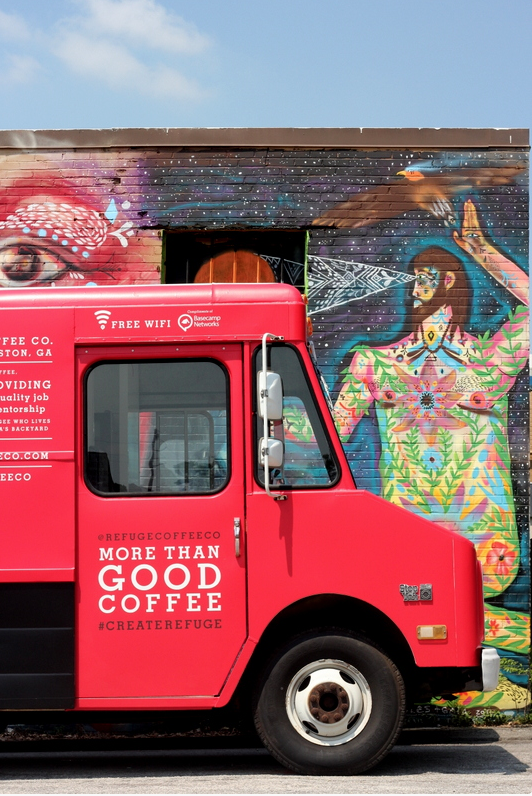
Refuge Coffee Co. Food Truck.
When you do get the opportunity for downtime, make sure to take advantage of it. Use these breaks as an opportunity to clean the truck, promote the business on social media, or follow up on catering opportunities.
As Drew stresses in the interview, every day operating a food truck is a little bit different. Be prepared for anything in the early days and recognize that you will be looking for ways to improve processes and operations overtime.
Step 5: License Requirements and Permits
The permits and license requirements of a coffee truck are different across each city and state in the United States. The bottom line is you will need to figure out the legal requirements to operate the coffee business in your specific area.
That being said these are the standard licenses and permits in most areas:
- Health Permit: This permit allows you to sell food or beverages to the public. Contact the county health department website you plan to operate for more information on what you’ll need to acquire this essential license.
- Fire Department: The local fire department will check your HVAC system and fire extinguishers to ensure you meet their requirements.
- Business license: Establishing a formal business entity whether that’s a sole proprietorship, LLC, partnership or corporation is required in the United States. This will also get you an EIN number.
- Vehicle license: Whether you own a trailer or truck, you’ll need a license within the state you plan to operate just like any other vehicle on the road.
- Food Handlers permit: Many cities and counties require that you take a class and pass a test for handling food. This permit is often required for a coffee truck even if you don’t plan to cook any food on the unit.
- Special event or temporary permit: If you plan to vend at special events like concerts, you will need to work with the event planner to identify what’s needed and the costs.
Related Reading: Why Do Coffee Shops Fail? 232 Owners Share Top Reasons
- Zoning and Parking Permits: Depending on the city or county, there might be specific regulations about where you can park your coffee truck and for how long. Zoning permits ensure you’re operating in compliance with local laws regarding mobile food vending locations.
- Liability Insurance: To protect your business from potential lawsuits or claims related to accidents, injuries, or other liabilities, having comprehensive liability insurance is crucial. This insurance can cover everything from customer injuries to employee accidents on the job.
- Workers’ Compensation Insurance: If you’re planning to hire employees, most states require you to carry workers’ compensation insurance. This insurance provides wage replacement and medical benefits to employees injured in the course of employment.
- Commissary Agreement (if applicable): Some local health departments require mobile food units to operate out of a licensed commercial kitchen or commissary. This agreement proves your access to such a facility for food prep, storage, and sanitation purposes.
Step 6: Launch
Plan a launch strategy for your coffee truck. This could include a soft opening, special promotions, and events to generate interest and attract customers.
Soft Opening
First up, you’ve got your soft opening. This is your trial run before the grand opening. Invite friends, family, and maybe a few local influencers or bloggers. The goal here isn’t just to celebrate; it’s to test your operations under real conditions. You’ll figure out the kinks in your workflow, how quickly you can serve up orders, and get some honest feedback on your coffee and menu items. Plus, it’s a great way to start spreading the word through personal networks and social media buzz.
Community Engagement
Don’t forget the power of the local community. Attend farmers markets, local festivals, or charity events where you can serve your coffee and get to know your customers. Engage with people, share your story, and get feedback. Being active in the community can build a loyal customer base that supports you not just for your coffee, but for your involvement and contribution to the area.
Collaborations can be gold. Partner up with local businesses or events that complement your coffee truck. Think bookstores, art galleries, or even fitness studios (everyone loves a good coffee after yoga or a workout). This not only broadens your exposure but also aligns your brand with other local favorites.
Collaborations & Events
Hosting events can also draw in crowds. Consider a launch event that’s themed—maybe a ‘Coffee and Live Music’ morning, or ‘Coffee Art’ where you showcase some latte art skills. Make it unique, make it memorable, and most importantly, make it Instagrammable. Social media love is free advertising.
Remember, even after you start your coffee truck continue to gather feedback from customers and adjust your menu, operations, and marketing strategies as necessary. Stay adaptable and look for opportunities to grow your business, such as catering events or expanding your menu. The launch of your business is only the beginning of the adaptations and adjustments you’ll need to build a profitable coffee business.
How Much Does It Cost to Start a Coffee Truck?
Expect to invest $50,000 minimum for a coffee truck that will pass your local health inspections with quality equipment installed and is reliable. You could easily spend as much as $100,000 or more on the truck you select and if the truck is brand new.
Here’s the estimated cost of a few different mobile coffee businesses:
- Coffee Push Cart or Bike: $10,000 – $25,000
- Coffee Trailer: $30,000 – $60,000
- Coffee Truck: $50,000 – $100,000 (Coffee trucks cost more because they have an engine.)
You might read something on blogs or forums of folks that have been able to open a coffee trailer for $20,000. It is possible by investing in a coffee cart that’s lower in price by buying used or non-commercial grade coffee equipment. But keep in mind that you’ll still need a vehicle haul a coffee trailer that isn’t included in these costs. If you already own a truck investing in a coffee trailer could be a good option. If you plan to serve in a stationery location, a trailer can also be a smart way to keep startup costs low.
Related Reading: How to Start a Coffee Shop on Your Own Terms
The other thing you want to keep in mind is that the truck is literally the face of your brand. If the truck doesn’t look good on the outside, people will associate the appearance with the quality of your coffee too. You’ll want a vehicle that looks good to give yourself the best chance of success.
Keep in mind that the figures mentioned above are broad estimates. Determining the the average cost of a coffee truck is always difficult to answer because it’s a variable cost that will depend on the size, year, equipment installed (this is a big one), business licenses in your area, if you’ll be operating a truck or trailer, and who is building it.
It’s a lot like asking someone the average price of a car. The price of a car will depend on the model, age, mileage, upgrades and other factors.
How Profitable is a Coffee Truck?
Based on our survey of 223 full-time food truck owners, over 50% report generating at least $150,000 in revenue per year after 2 years or more in business. Coffee truck owners can expect to see similar revenues if you operate the business full-time and establish name recognition locally. Profit margins for coffee trucks and cafes often range from 15% to 25%, but these figures can be higher or lower based on the specifics of the operation.
For example, if a coffee truck generates $15,000 in sales per month and has costs of goods sold at 35% ($5,250), labor and additional expenses totaling 50% ($7,500), the profit before taxes would be $2,250, which is a 15% profit margin. Most new coffee truck founders do all the work themselves and eliminate the labor expenses and retain those profits for themselves.
Overall, coffee is a high-profit margin business. A cup of coffee that costs you less than 50 cents to produce can be sold at retail for $3.00 – $4.00 a cup on average.

Opening a coffee trailer?
You can start to estimate your break even numbers for the business as a whole by determining the cost of your coffee, how many sales you anticipate, and the profit margin of each customer. I advise putting together a formal business plan to come up with a basic sales forecast.
As a general rule of thumb, you’ll want to shoot for over $100,000 in sales per year as a full-time owner operator. This will ensure you’re able to pay for licenses, the truck, insurance, inventory and other expenses for the business.

